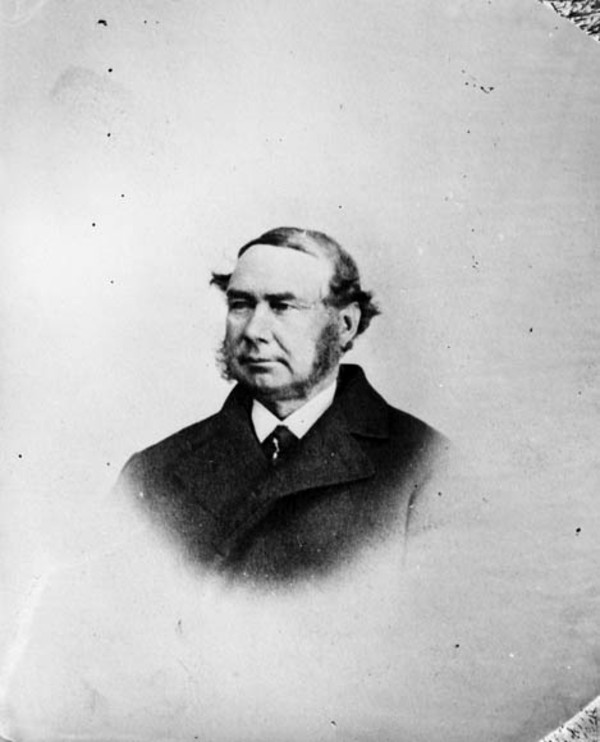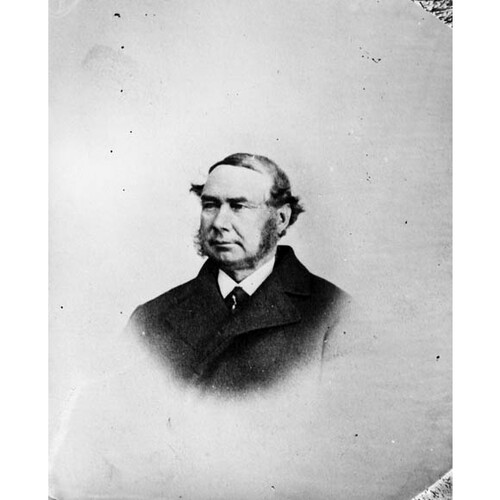McKEAGNEY, JAMES CHARLES, lawyer, politician, and judge; b. in 1815 in County Tyrone, Ireland; d. 14 Sept. 1879 in St Andrews, N.B.
James Charles McKeagney’s family migrated to Nova Scotia in 1822, and he was educated in Baddeck, Cape Breton Island, and at McQueen’s Academy in Halifax. On 20 Oct. 1842 he married Eliza Henry of Antigonish. Six years after her death in 1851, he married Eliza Hearne of Sydney.
McKeagney was called to the bar of Nova Scotia in October 1838 and appointed a qc in 1866. He was elected to the assembly for Richmond County in 1840 as a Reformer but was unseated on a technicality. In 1843 he successfully ran in Inverness County; McKeagney, however, was a non-resident and this fact was used by Peter Smyth, also a Reformer, to defeat him in the election of 10 Aug. 1847. Elected in Sydney Township in a by-election in 1848, he served in 1851 as minister without portfolio in the Liberal government until his defeat six months after his appointment. Re-elected in 1855, he was one of the Roman Catholics who helped bring the Conservatives to power when he crossed the floor in 1857 [see Joseph Howe and James W. Johnston]. In December 1857 McKeagney was appointed to the new position of inspector of mines and minerals, his principal duty being to carry out the terms of an agreement with the General Mining Association concerning the mineral resources of the province. In 1859 he declared that his heavy duties precluded his running for election again, but comments from the Antigonish Casket, which supported him, indicated that he was unhappy over not receiving a promotion.
In 1867 McKeagney was elected to the federal parliament for Cape Breton County as an anti-confederate, though prior to the election he had promised the bishop of Arichat, Colin Francis MacKinnon, to accept confederation. However, in 1868 he was forced by opposition within his own county to support the agitation for repeal of union, although he assured John A. Macdonald* that, in a crisis, he would vote with the government. His tactics were unsuccessful and he was defeated in the general election in 1872.
Privately, however, McKeagney had been promised a judicial appointment in Manitoba by Charles Tupper* if he contested the election, thereby splitting the Nova Scotia Catholic vote. Macdonald was afraid that McKeagney was too old but Thomas Louis Connolly, archbishop of Halifax, strongly supported the appointment. McKeagney, apart from his experience as a lawyer, had gained some judicial training as judge of probate for Cape Breton from 1848 until 1867 and also as a surrogate in the Court of Vice-Admiralty. He was appointed as a puisne judge of the Queen’s Bench of Manitoba on 7 Oct. 1872. During his tenure, he served as administrator of Manitoba from 10 Jan. 1873 until 7 Sept. 1874. He was again administrator on 28 Feb. 1876, becoming acting lieutenant governor of Manitoba and the North-West Territories on 25 Aug. 1876. From 1873 until 1875 McKeagney also investigated claims arising from the uprising led by Louis Riel*. The most dramatic cases heard by McKeagney were the trials of Ambroise-Dydime Lépine* [see Bétournay] and of André Nault* in 1874 for the murder of Thomas Scott*; the trial of Nault ended in a split jury.
McKeagney’s political career in Nova Scotia, often influenced by his defence of the Roman Catholic church, suggests that, though the religious issue disrupted party organization, it did not force a man to change his political principles. McKeagney’s now faint reputation in Manitoba would indicate that he was barely competent either as a lawyer or as a judge during that phase of his career.
PAC, MG 26, A (Macdonald papers), pp.47030–40, 47069–72, 47124–26, 47357–58, 47401–3, 157564–67; letter books, 12, 20. The Canadian legal directory: a guide to the bar and bench of the dominion of Canada, ed. H. J. Morgan (Toronto, 1878), 238–39. Directory of N.S. MLAs (Fergusson), 223–24. D. G. Whidden, The history of the town of Antigonish (Wolfville, N.S., 1934), 101–3. F. J. Wilson, “The most reverend Thomas L. Connolly, archbishop of Halifax,” CCHA Report, 1943–44, 55–108.
Cite This Article
K. G. Pryke, “McKEAGNEY, JAMES CHARLES,” in Dictionary of Canadian Biography, vol. 10, University of Toronto/Université Laval, 2003–, accessed April 28, 2025, https://www.biographi.ca/en/bio/mckeagney_james_charles_10E.html.
The citation above shows the format for footnotes and endnotes according to the Chicago manual of style (16th edition). Information to be used in other citation formats:
| Permalink: | https://www.biographi.ca/en/bio/mckeagney_james_charles_10E.html |
| Author of Article: | K. G. Pryke |
| Title of Article: | McKEAGNEY, JAMES CHARLES |
| Publication Name: | Dictionary of Canadian Biography, vol. 10 |
| Publisher: | University of Toronto/Université Laval |
| Year of revision: | 1972 |
| Access Date: | April 28, 2025 |




